2018高考英语高考英语专项听力模拟训练二——时间(when)
- 格式:doc
- 大小:99.50 KB
- 文档页数:2
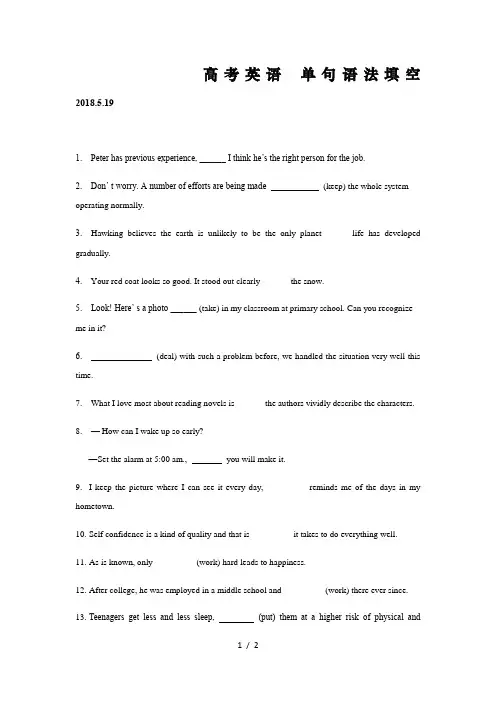
高考英语单句语法填空2018.5.191. Peter has previous experience, ______ I think he’s the right person for the job.2. Don’ t worry. A number of efforts are being made (keep) the whole system operating normally.3. Hawking believes the earth is unlikely to be the only planet _____ life has developed gradually.4. Your red coat looks so good. It stood out clearly ______ the snow.5. Look! Here’ s a photo ______ (take) in my classroom at primary school. Can you recognize me in it?6. (deal) with such a problem before, we handled the situation very well this time.7. What I love most about reading novels is ______ the authors vividly describe the characters.8. — How can I wake up so early?—Set the alarm at 5:00 am., you will make it.9.I keep the picture where I can see it every day, _________ reminds me of the days in my hometown.10.Self confidence is a kind of quality and that is _________ it takes to do everything well.11.As is known, only _________ (work) hard leads to happiness.12.After college, he was employed in a middle school and _________ (work) there ever since.13.Teenagers get less and less sleep, (put) them at a higher risk of physical andmental health problems.14.—Thank you for reminding me of the time,otherwise I (be) late yesterday—Don’t mention it.15.It’s important for a girl to know what colors look good her skin.16.Travel Frog(create) by a Japanese game studio has become a hit in China.17.Beijing plans to build its first bicycle lane connects a residential area with a business center【参考答案】1.so2.to keep3.where4.against5.taken6.Having dealt with7.how8.and9.which 10.what11.working 12.has worked 13.putting 14.would have been 15.against 16.created 17.which。
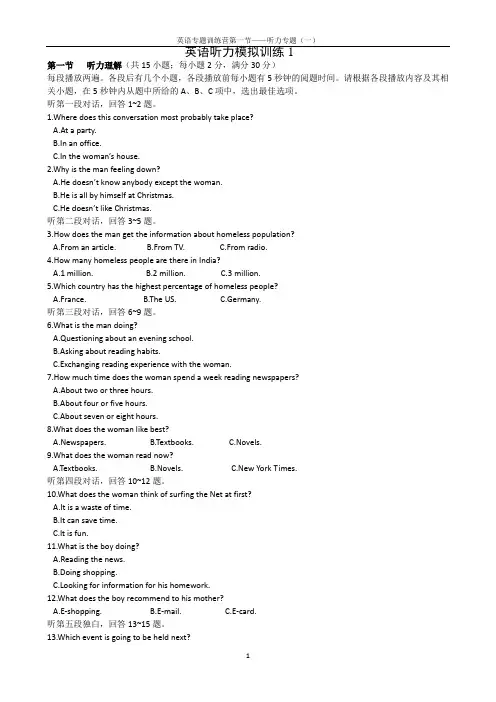
英语听力模拟训练1第一节听力理解(共15小题;每小题2分,满分30分)每段播放两遍。
各段后有几个小题,各段播放前每小题有5秒钟的阅题时间。
请根据各段播放内容及其相关小题,在5秒钟内从题中所给的A、B、C项中,选出最佳选项。
听第一段对话,回答1~2题。
1.Where does this conversation most probably take place?A.At a party.B.In an office.C.In the woman’s house.2.Why is the man feeling down?A.He doesn’t know anybody except the woman.B.He is all by himself at Christmas.C.He doesn’t like Christmas.听第二段对话,回答3~5题。
3.How does the man get the information about homeless population?A.From an article.B.From TV.C.From radio.4.How many homeless people are there in India?A.1 million.B.2 million.C.3 million.5.Which country has the highest percentage of homeless people?A.France.B.The US.C.Germany.听第三段对话,回答6~9题。
6.What is the man doing?A.Questioning about an evening school.B.Asking about reading habits.C.Exchanging reading experience with the woman.7.How much time does the woman spend a week reading newspapers?A.About two or three hours.B.About four or five hours.C.About seven or eight hours.8.What does the woman like best?A.Newspapers.B.Textbooks.C.Novels.9.What does the woman read now?A.Textbooks.B.Novels.C.New York Times.听第四段对话,回答10~12题。
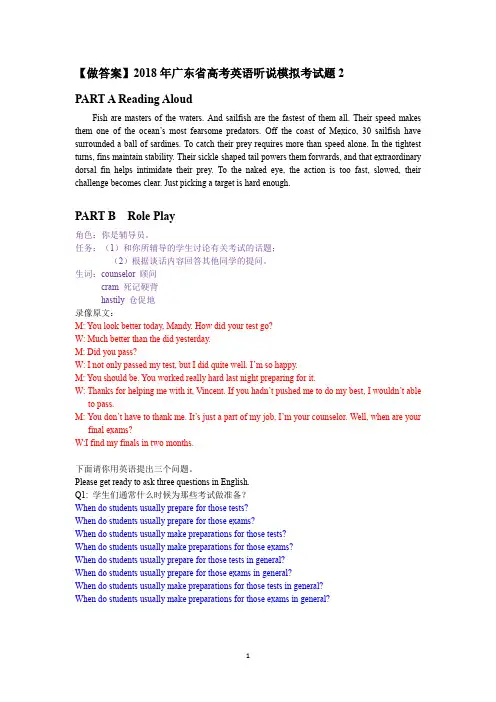
【做答案】2018年广东省高考英语听说模拟考试题2PART A Reading AloudFish are masters of the waters. And sailfish are the fastest of them all. Their speed makes them one of the ocean’s most fearsome predators. Off the coast of Mexico, 30 sailfish have surrounded a ball of sardines. To catch their prey requires more than speed alone. In the tightest turns, fins maintain stability. Their sickle-shaped tail powers them forwards, and that extraordinary dorsal fin helps intimidate their prey. To the naked eye, the action is too fast, slowed, their challenge becomes clear. Just picking a target is hard enough.PART B Role Play角色:你是辅导员。
任务:(1)和你所辅导的学生讨论有关考试的话题;(2)根据谈话内容回答其他同学的提问。
生词:counselor 顾问cram 死记硬背hastily 仓促地录像原文:M: You look better today, Mandy. How did your test go?W: Much better than the did yesterday.M: Did you pass?W: I not only passed my test, but I did quite well. I’m so happy.M: You should be. You worked really hard last night preparing for it.W: Thanks for helping me with it, Vincent. If you hadn’t pushed me to do my best, I wouldn’t able to pass.M: You don’t have to thank me. It’s just a part of my job, I’m your counselor. Well, when are your final exams?W:I find my finals in two months.下面请你用英语提出三个问题。
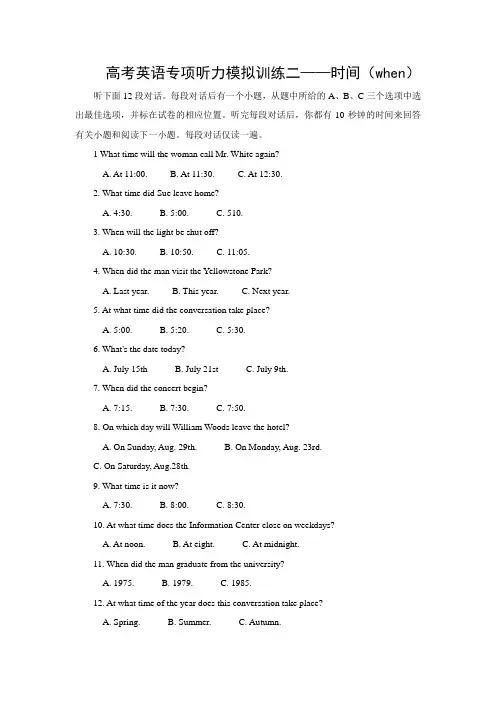
高考英语专项听力模拟训练二——时间(when)听下面12段对话。
每段对话后有一个小题,从题中所给的A、B、C三个选项中选出最佳选项,并标在试卷的相应位置。
听完每段对话后,你都有10秒钟的时间来回答有关小题和阅读下一小题。
每段对话仅读一遍。
1 What time will the woman call Mr. White again?A. At 11:00.B. At 11:30.C. At 12:30.2. What time did Sue leave home?A. 4:30.B. 5:00.C. 510.3. When will the light be shut off?A. 10:30.B. 10:50.C. 11:05.4. When did the man visit the Yellowstone Park?A. Last year.B. This year.C. Next year.5. At what time did the conversation take place?A. 5:00.B. 5:20.C. 5:30.6. What's the date today?A. July 15thB. July 21stC. July 9th.7. When did the concert begin?A. 7:15.B. 7:30.C. 7:50.8. On which day will William Woods leave the hotel?A. On Sunday, Aug. 29th.B. On Monday, Aug. 23rd.C. On Saturday, Aug.28th.9. What time is it now?A. 7:30.B. 8:00.C. 8:30.10. At what time does the Information Center close on weekdays?A. At noon.B. At eight.C. At midnight.11. When did the man graduate from the university?A. 1975.B. 1979.C. 1985.12. At what time of the year does this conversation take place?A. Spring.B. Summer.C. Autumn.答案:BACAB ABABA BA。
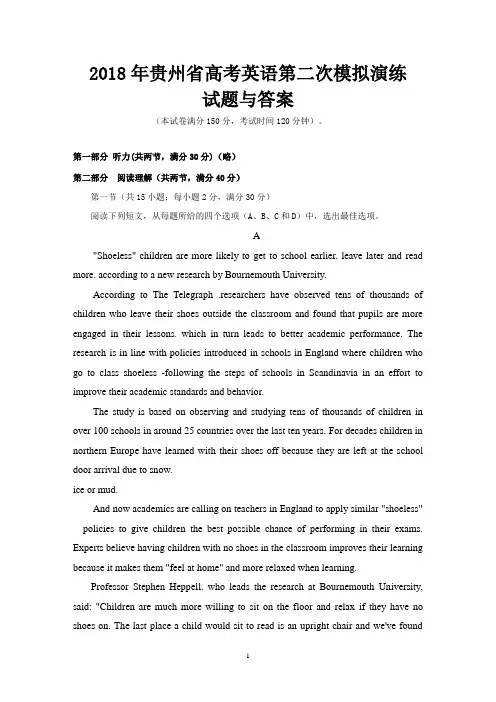
2018年贵州省高考英语第二次模拟演练试题与答案(本试卷满分150分,考试时间120分钟)。
第一部分听力(共两节,满分30分)(略)第二部分阅读理解(共两节,满分40分)第一节(共15小题;每小题2分,满分30分)阅读下列短文,从每题所给的四个选项(A、B、C和D)中,选出最佳选项。
A"Shoeless" children are more likely to get to school earlier. leave later and read more. according to a new research by Bournemouth University.According to The Telegraph .researchers have observed tens of thousands of children who leave their shoes outside the classroom and found that pupils are more engaged in their lessons. which in turn leads to better academic performance. The research is in line with policies introduced in schools in England where children who go to class shoeless -following the steps of schools in Scandinavia in an effort to improve their academic standards and behavior.The study is based on observing and studying tens of thousands of children in over 100 schools in around 25 countries over the last ten years. For decades children in northern Europe have learned with their shoes off because they are left at the school door arrival due to snow.ice or mud.And now academics are calling on teachers in England to apply similar "shoeless" policies to give children the best possible chance of performing in their exams. Experts believe having children with no shoes in the classroom improves their learning because it makes them "feel at home" and more relaxed when learning.Professor Stephen Heppell. who leads the research at Bournemouth University, said: "Children are much more willing to sit on the floor and relax if they have no shoes on. The last place a child would sit to read is an upright chair and we've foundthat 95 percent of them actually don't read on a chair at home. When they go on holidays they read lying down. Having conditions in the classroom that are like those at home means that more boys are reading in the classroom. Children also arrive earlier and leave later. which translates into half an hour of extra learning a day on average.”Wearing no shoes also means the cleaning bill decreased by 27 percent and schools need tospend less money on furniture because they don't need to buy a chair and a table for every child as they can sit on the 21. In the classroom. shoeless kids were found to be more_.A. absent-mindedB. politeC. focusedD. restless22. What can we conclude from Professor Heppell's words in Paragraph 5?A. Children learn faster in an upright sitting position.B. Classrooms should have their conditions improved.C. Habits formed at an early age are rarely changed.D. Children naturally prefer to read in a relaxed position.23. Why do children in northern Europe go to class shoeless?A. They have to he barefoot for their family conditions.B. They follow the customs front their ancestors.C. They feel more comfortable without shoesD. They have to leave the muddy shoes outside the classrooms.24. What could he the best title for the text?A. Policies help schools cut down on spendingB. Shoeless children do better at schoolC. "Shoeless" policies benefit kids in England$来&源:D. Good behavior pays off in the endBI was talking with a friend not long ago who mentioned he was taking his childrento Paris for the summer vacation, and the only thing I could think of was how grateful I was that my father never did that for me. Our vacations were spent 50 miles south of our home in Indiana, at Lane’s Camping Retreat.The campground had two lakes: one for fishing, the other for swimming. The swimming lake had a diving board about 300 feet high, and every year some kid made his way to the end of the board and then froze with fear. We’d run to the camp store and fetch Mr. Lane, who would walk down to the lake and yell at the kid to jump. But he never would. So Mr. Lane would climb the ladder, throw the kid over his shoulder, and climb back down.One year, our dad bought a tractor inner tube, which amazed us---we had begged him for years for something to float on, and he had resisted, saying it would cause wild excitement and we would drown. Then, unexpectedly, he bought the tube, which lasted several minutes before it broke and sank while my brother was on it. He would have drowned, except he was five feet tall and the water was only three feet deep, so he just stood up and walked to shore.After supper, we would sleep with the tent windows rolled up and Dad telling ghost stories. The raccoons(浣熊)would come out from the woods and move around the campfire, eating the spilled(散落的)pie filling.“What’s that?” Dad would ask. “Someone’s out there. Can you hear them?”We would pull our sleeping bags over our heads and dream of serial killers, then awaken to the sound of birdsong.Though I have never been to Paris, I can’t for the life of me consider myself deprived(被剥夺的).25. What happened when the author’s brother floated on the water?A. He fell into the lake.B. He was hurt by the tube.C. He ran wild for several minutes.D. He drowned due to the excitement.26. How did the author feel about his friend’s summer trip?A. It was tiring.B. It was boring.C. It was costly.D. It was admirable.27. Why did Mr. Lane come to the swimming lake?A. To punish the naughty kid.B. To guarantee the kid’s safety.C. To teach the kids swimming skills.D. To help the kids overcome their fear of diving.28. For what reason did the kids pull their sleeping bags over their heads?A. They wanted to drive the raccoons away.B. They were frightened.C. They found the campfire unbearable.D. They felt very coldCProsocial behaviors are those intended to help other people. Behaviors that can be described as prosocial include feeling empathy(同感) and concern for others and behaving in ways to help or benefit other people.Prosocial behavior has long posed a challenge to social scientists seeking to understand why people engage in helping behaviors that are beneficial to others, but costly to the individual performing the action. Why would people do something that benefits someone else but offers no immediate benefit to the doer?Psychologists suggest that there are a number of reasons why people engage in prosocial behavior. In many cases, such behaviors are fostered during childhood and adolescence as adults encourage children to share, act kindly, and help others. Prosocial behaviors are often seen as being compelled by a number of factors including egoistic reasons (doing things to improve one's self-image), reciprocal benefits (doing something nice for someone so that they may one day return the favor), and more altruistic reasons (performing actions purely out of empathy for another individual).Characteristics of the situation can also have a powerful impact on whether or not people engage in prosocial actions. The bystander effect is one of the most notableexamples of how the situation can impact helping behaviors. The bystander effect refers to the tendency for people to become less likely to assist a person in distress when there are a number of other people also present. For example, if you drop your purse and several items fall out on the ground, the likelihood that someone will stop and help you decreases if there are many other people present. This same sort of thing can happen in cases where someone is in serious danger, such as when someone is involved in a car accident. In some cases, witnesses might assume that since there are so many other people present, someone else will have surely already called for help.Why do people help in some situations but not in others? Experts have discovered a number of different situational variables that contribute to (and sometimes interfere with) prosocial behaviors. First, the more people that are present decreases the amount of personal responsibility people feel in a situation. People also tend to look to others for how to respond in such situations, particularly if the event contains some level of ambiguity. Fear of being judged by other members of the group also plays a role. People sometimes fear leaping to assistance, only to discover that their help was unwanted or unwarranted. In order to avoid being judged by other bystanders, people simply take no action.Experts have suggested that some key things must happen in order for a person to take action.29. Which situation can be described as the bystander effect?A. When hearing an injured lady crying for help, the neighbors didn’t take action.B. On the scene of your colleague’s traffic accide nt, you called the police for helpC. A woman was to give birth on the train and you were the only doctor there.D. Seeing an old man slipping on the icy road, many people volunteered to help.30. What does the underlined word “distress” in the fourth par agraph mean?A. comfortB. despairC. peaceD. trouble31. Prosocial behaviors are motivated for all the following reasons EXCEPT________.A. the desire to better one’s self-imageB. instant benefits of helping othersC. parental influences in the early lifeD. empathy for another individual32. After the last paragraph, the most possible topic could be ________.A. situational influences on prosocial behaviorB. various reasons for prosocial behaviorC. possible benefits of prosocial behaviorD. skills and knowledge to provide assistanceDIn many countries, schools have long summer holidays, with shorter holidays in between. However, a new report suggests shortening school holidays to stop children forgetting what they have learnt during the long summer break. Instead of three school terms, it says, there should be five eight-week terms. And there should be just four weeks off in the summer, with a two-week break between the other terms.Sonia Montero has two children at primary school and works full-time. She supports the idea. “The kids,” she says, “have much longer holidays than me and I can’t afford to take several weeks off work, so I need someone to take care of them. But nobody wants the work in the summer months — they all have holidays of their own.”Not surprisingly, some young people disagree. Student Jason Panos says “It’s a stupid idea. I would hate staying at school in the summer. It’s unfair, too. The people who suggest this had long school holidays when they were young, but now they want to stop us enjoying the summer. The kids in Spain and America have much longer holidays than here, but they don’t forget everything they’ve learnt in a few months.”Nadia Salib agrees. “Sure,” she says, “the first week at school after the s ummer is never easy, but you soon get back into it. The real problem round here is that kids get bored after so many weeks out of school, and then some of them start causing trouble. But the answer is to give them something to do, not make everyone stay in school longer.”33. What does Nadia say about young people on summer holidays?A. They need something to do to enrich themselves.B. Long holidays are very bad for their education.C. They would like to spend more time at school.D. Long holidays should be shortened to stop them causing trouble.34. What does Jason say about long summer holidays?A. These days many older people have them too.B. Schools in other countries don’t have them.C. They can help children forget about school. D. T hey have little influence on children’s education.35. Why is Sonia in support of shorter school holidays?A. .She can’t afford to pay someone to look after her children.B. She is worried that her children will forget what they’ve learnt.C. She doesn’t get any summer holidays in her jobD. She can’t get anyone to look after her children in summer.第二节(共5小题;每小题2分,满分10分)根据短文内容,从短文后的选项中选出能填入空白处的最佳选项。
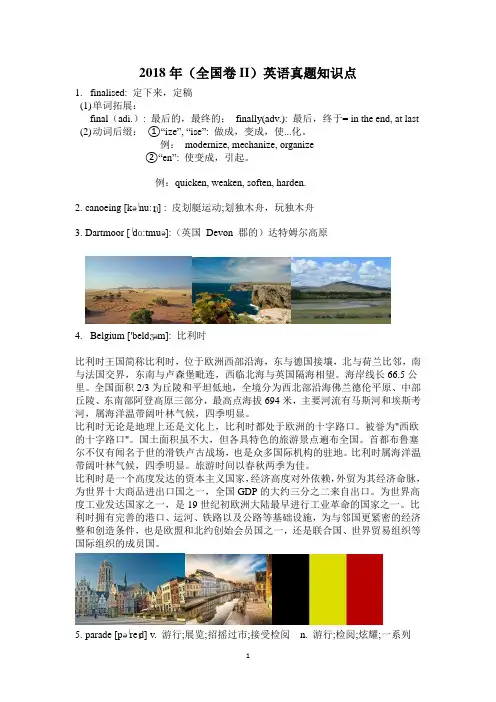
2018年(全国卷II)英语真题知识点1.finalised: 定下来,定稿(1)单词拓展:final(adi.): 最后的,最终的;finally(adv.): 最后,终于= in the end, at last (2)动词后缀:①“ize”, “ise”: 做成,变成,使...化。
例:modernize, mechanize, organize②“en”: 使变成,引起。
例:quicken, weaken, soften, harden.2.canoeing [kəˈnu:ɪŋ] : 皮划艇运动;划独木舟,玩独木舟3.Dartmoor [ˈdɑ:tmuə]:(英国Devon 郡的)达特姆尔高原4.Belgium ['beldʒəm]: 比利时比利时王国简称比利时,位于欧洲西部沿海,东与德国接壤,北与荷兰比邻,南与法国交界,东南与卢森堡毗连,西临北海与英国隔海相望。
海岸线长66.5公里。
全国面积2/3为丘陵和平坦低地,全境分为西北部沿海佛兰德伦平原、中部丘陵、东南部阿登高原三部分,最高点海拔694米,主要河流有马斯河和埃斯考河,属海洋温带阔叶林气候,四季明显。
比利时无论是地理上还是文化上,比利时都处于欧洲的十字路口。
被誉为"西欧的十字路口"。
国土面积虽不大,但各具特色的旅游景点遍布全国。
首都布鲁塞尔不仅有闻名于世的滑铁卢古战场,也是众多国际机构的驻地。
比利时属海洋温带阔叶林气候,四季明显。
旅游时间以春秋两季为佳。
比利时是一个高度发达的资本主义国家,经济高度对外依赖,外贸为其经济命脉,为世界十大商品进出口国之一,全国GDP的大约三分之二来自出口。
为世界高度工业发达国家之一,是19世纪初欧洲大陆最早进行工业革命的国家之一。
比利时拥有完善的港口、运河、铁路以及公路等基础设施,为与邻国更紧密的经济整和创造条件,也是欧盟和北约创始会员国之一,还是联合国、世界贸易组织等国际组织的成员国。
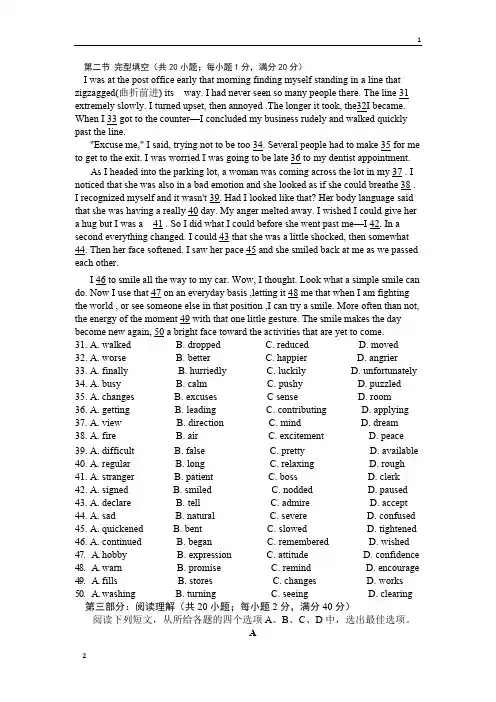
第二节完型填空(共20小题;每小题1分,满分20分)I was at the post office early that morning finding myself standing in a line that zigzagged(曲折前进) its way. I had never seen so many people there. The line 31 extremely slowly. I turned upset, then annoyed .The longer it took, the32I became. When I 33 got to the counter—I concluded my business rudely and walked quickly past the line."Excuse me," I said, trying not to be too 34. Several people had to make 35 for me to get to the exit. I was worried I was going to be late 36 to my dentist appointment.As I headed into the parking lot, a woman was coming across the lot in my 37 . I noticed that she was also in a bad emotion and she looked as if she could breathe 38 .I recognized myself and it wasn't 39. Had I looked like that? Her body language said that she was having a really 40 day. My anger melted away. I wished I could give her a hug but I was a 41 . So I did what I could before she went past me—I 42. In a second everything changed. I could 43 that she was a little shocked, then somewhat 44. Then her face softened. I saw her pace 45 and she smiled back at me as we passed each other.I 46 to smile all the way to my car. Wow, I thought. Look what a simple smile can do. Now I use that 47 on an everyday basis ,letting it 48 me that when I am fighting the world , or see someone else in that position ,I can try a smile. More often than not, the energy of the moment 49 with that one little gesture. The smile makes the day become new again, 50 a bright face toward the activities that are yet to come.31. A. walked B. dropped C. reduced D. moved32. A. worse B. better C. happier D. angrier33. A. finally B. hurriedly C. luckily D. unfortunately34. A. busy B. calm C. pushy D. puzzled35. A. changes B. excuses C sense D. room36. A. getting B. leading C. contributing D. applying37. A. view B. direction C. mind D. dream38. A. fire B. air C. excitement D. peace39. A. difficult B. false C. pretty D. available40. A. regular B. long C. relaxing D. rough41. A. stranger B. patient C. boss D. clerk42. A. signed B. smiled C. nodded D. paused43. A. declare B. tell C. admire D. accept44. A. sad B. natural C. severe D. confused45. A. quickened B. bent C. slowed D. tightened46. A. continued B. began C. remembered D. wished47. A. hobby B. expression C. attitude D. confidence48. A. warn B. promise C. remind D. encourage49. A. fills B. stores C. changes D. works50. A. washing B. turning C. seeing D. clearing第三部分:阅读理解(共20小题;每小题2分,满分40分)阅读下列短文,从所给各题的四个选项A、B、C、D中,选出最佳选项。
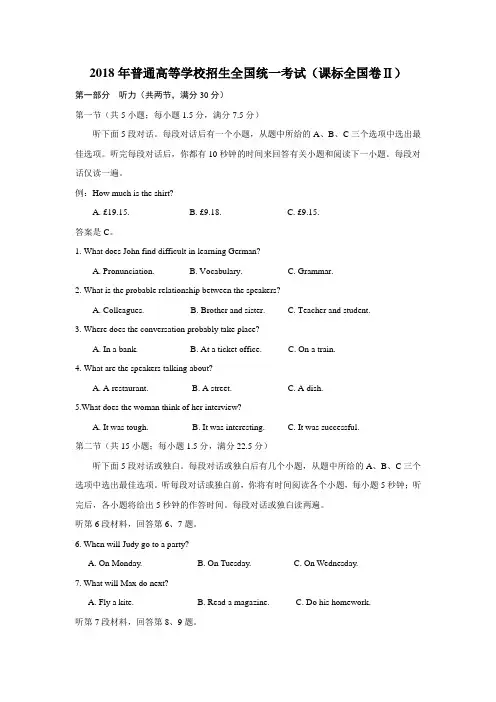
2018年普通高等学校招生全国统一考试(课标全国卷Ⅱ)第一部分听力(共两节,满分30分)第一节(共5小题;每小题1.5分,满分7.5分)听下面5段对话。
每段对话后有一个小题,从题中所给的A、B、C三个选项中选出最佳选项。
听完每段对话后,你都有10秒钟的时间来回答有关小题和阅读下一小题。
每段对话仅读一遍。
例:How much is the shirt?A. £19.15.B. £9.18.C. £9.15.答案是C。
1. What does John find difficult in learning German?A. Pronunciation.B. Vocabulary.C. Grammar.2. What is the probable relationship between the speakers?A. Colleagues.B. Brother and sister.C. Teacher and student.3. Where does the conversation probably take place?A. In a bank.B. At a ticket office.C. On a train.4. What are the speakers talking about?A. A restaurant.B. A street.C. A dish.5.What does the woman think of her interview?A. It was tough.B. It was interesting.C. It was successful.第二节(共15小题;每小题1.5分,满分22.5分)听下面5段对话或独白。
每段对话或独白后有几个小题,从题中所给的A、B、C三个选项中选出最佳选项。
听每段对话或独白前,你将有时间阅读各个小题,每小题5秒钟;听完后,各小题将给出5秒钟的作答时间。
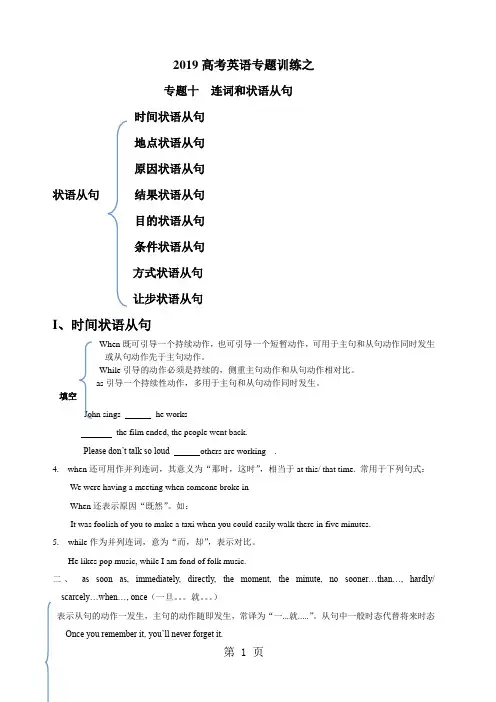
2019高考英语专题训练之专题十连词和状语从句时间状语从句地点状语从句原因状语从句状语从句结果状语从句目的状语从句条件状语从句方式状语从句让步状语从句I、时间状语从句When既可引导一个持续动作,也可引导一个短暂动作,可用于主句和从句动作同时发生或从句动作先于主句动作。
While引导的动作必须是持续的,侧重主句动作和从句动作相对比。
as引导一个持续性动作,多用于主句和从句动作同时发生。
填空John sings he worksthe film ended, the people went back.Please don’t talk so loud others are working .4. when还可用作并列连词,其意义为“那时,这时”,相当于at this/ that time. 常用于下列句式:We were having a meeting when someone broke inWhen还表示原因“既然”。
如:It was foolish of you to make a taxi when you could easily walk there in five minutes.5.while作为并列连词,意为“而,却”,表示对比。
He likes pop music, while I am fond of folk music.二、as soon as, immediately, directly, the moment, the minute, no sooner…than…, hardly/ scarcely…when…, once(一旦。
就。
)表示从句的动作一发生,主句的动作随即发生,常译为“一...就.....”。
从句中一般时态代替将来时态Once you remember it, you’ll never forget it.The moment I heard the voice, I knew father was coming.▲注意:No sooner…than, hardly/ scarcely…when…主句-----过去完成时,从句----一般过去时,当把no sooner和hardly/ scarcely提到句首时,应用倒装语序。
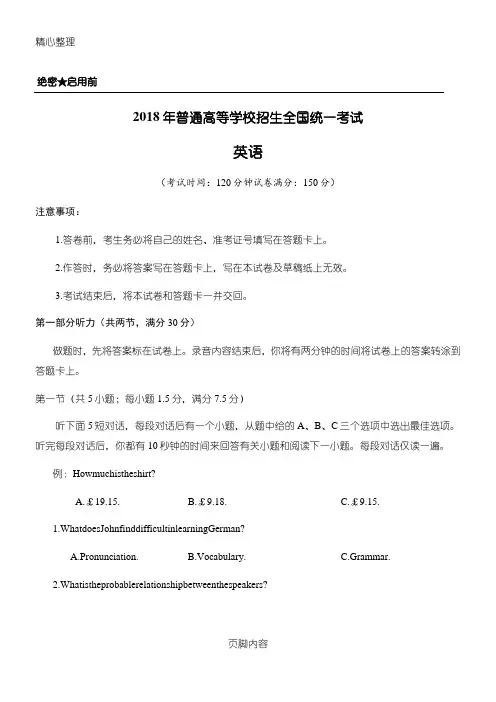
绝密★启用前2018年普通高等学校招生全国统一考试英语(考试时间:120分钟试卷满分:150分)注意事项:1.2.3.第一部分听力(共两节,满分30分)答题卡上。
第一节(共听下面A、B、C三个选项中选出最佳选项。
例:A. C.£9.15.1.WhatdoesJohnfinddifficultinlearningGerman?A.Pronunciation.B.Vocabulary.C.Grammar.2.Whatistheprobablerelationshipbetweenthespeakers?A.Colleagues.B.Brotherandsister.C.Teacherandstudent.3.Wheredoestheconversationprobablytakeplace?A.Inabank.B.Ataticketoffice.C.Onatrain.4.Whatarethespeakerstalkingabout?A.Arestaurant.B.Astreet.5.Whatdoesthewomanthinkofherinterview?A.Itwastough.第二节(共15小题;每小题1.5分,满分22.5听下面5将给出5听第6C.OnWednesday.C.Dohishomework.听第7段材料,回答第8、9题。
8.Whatdoesthemansuggestdoingatfirst?A.Goingtoaconcert.B.Watchingamovie.C.Playingacomputergame.9.Whatdothespeakersdecidetodo?A.VisitMike.B.Goboating.C.Takeawalk.听第8段材料,回答第10至12题。
10.Whichcolordocatsseebetterthanhumans?A.Red.B.Green.C.Blue.11.Whydocatsbringdeadbirdshome?A.Toeattheminasafeplace.B.Toshowofftheirhuntingskills.C.Tomaketheirownershappy.A.Grateful.B.Humorous.听第9段材料,回答第13至16题。
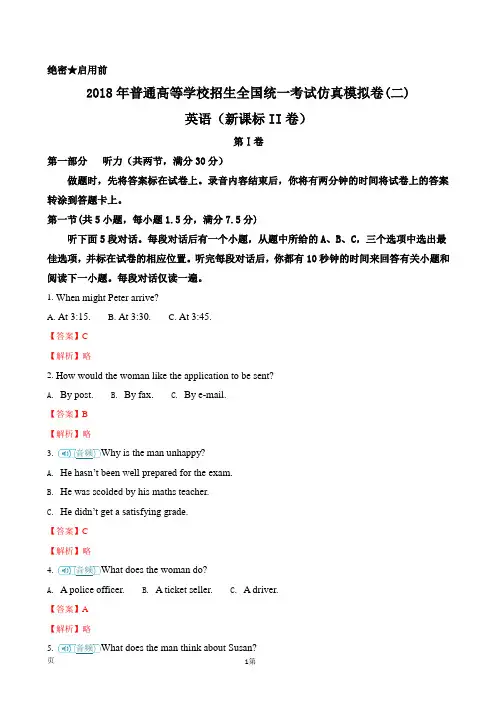
绝密★启用前2018年普通高等学校招生全国统一考试仿真模拟卷(二)英语(新课标II卷)第Ⅰ卷第一部分听力(共两节,满分30分)做题时,先将答案标在试卷上。
录音内容结束后,你将有两分钟的时间将试卷上的答案转涂到答题卡上。
第一节(共5小题,每小题1.5分,满分7.5分)听下面5段对话。
每段对话后有一个小题,从题中所给的A、B、C,三个选项中选出最佳选项,并标在试卷的相应位置。
听完每段对话后,你都有10秒钟的时间来回答有关小题和阅读下一小题。
每段对话仅读一遍。
1. When might Peter arrive?A. At 3:15.B. At 3:30.C. At 3:45.【答案】C【解析】略2. How would the woman like the application to be sent?A. By post.B. By fax.C. By e-mail.【答案】B【解析】略3.音频Why is the man unhappy?A. He hasn‟t been well prepared for the exam.B. He was scolded by his maths teacher.C. He didn‟t get a satisfying grade.【答案】C【解析】略4.音频What does the woman do?A. A police officer.B. A ticket seller.C. A driver.【答案】A【解析】略5.音频What does the man think about Susan?A. She is like many other people.B. She always keeps her word.C. She is tougher than men.【答案】B【解析】略第二节(共15 小题;每小题1分,满分22.5分)听下面5段对话或独白。
2018年上海市虹口区高考英语二模试卷2018年上海市虹口区高考英语二模试卷II. Grammar and VocabularySection ADirections:After reading the passage below,fill in the blanks to make the passage coherent and grammatically correct. For the blanks with a given word, fill in each blank with the proper form of the given word;for the other blanks, use one word that best fits each blank.1.阅读下面短文,在空白处填入1个适当的单词或括号内单词的正确形式。
Nook’s arrival, Good or Bad?Booklovers, most of them, will tell you(1)______ a pleasure it is to lend a favorite read toa friend—the novel you stayed up all night to get to the end of; the travel book that madeyou feel(2)______ you yourself were on a train ride through India. For a while it seemed that e-book users were to be denied this pleasure of lending to friends. You could buy a book or magazine for your r eading device, but you couldn’t lend it out.But now, with the Nook, the US book chain Barnes and Noble’s response to Amazon’s Kindle, electronic read ers will be able to have their latest literary enthusiasm(3)______(press)on their friends, just like readers of physical books can. You simply email the book from your Nook and your friend can read it for two weeks,(4)______(use)any device with the Barnes & amp; Noble e-book reader software. It’s a big improvement from previous e-book readers.The Nook offers other features too. You read in black andwhite on the main screen, just like with Kindle. The difference is (5)______ on the lower part of the device there’s a color touch screen,(6)______ allows you to browse through a book or magazine, but goes black whe n you’re not using it so that you save power.(7)______ exciting thing about the Nook is that it offers Wi-Fi, arguably a big advance on previous e-book readers. Customers in the United States can use the Internet connection (8)______(read)whole e-books at Barnes and Noble’s hundreds of bookstores for free. None of Barnes and Noble’s competitors can come close to this.But the Nook, ironically,(9)______(turn out)to be a money-loser for Barnes and Noble, or at least a job-loser for Barnes and Noble’s employee s. According to Marian Maneker atThe Big Money Website,(10)______ the Nook is successful it might take sales from the company’s bookstores, eventua lly forcing their closure and the loss of thousands of jobs.【答案】(1)what,(2)as if/ though,(3)pressed,(4)using,(5)that,(6)which,(7)Another,(8)to read,(9)has turned out/turns out,(10)if【考点】固定用法高三说明文语法填空句子基础知识动词时态代词表语从句非限制性定语从句状语从句过去分词动名词从属连词【解析】本文属于说明文阅读,主要介绍了一种新的电子书阅读器NooK。
2018年江苏省南京市、盐城市高三第二次模拟考试试题英语本卷分为第Ⅰ卷(选择题)和第Ⅱ卷(非选择题),满分120分。
考试时间120分钟。
第一部分听力(共两节,满分30分)第二部分英语知识运用(共两节,满分35分)(略)第一节单项填空(共15小题,每小题1分,满分15分)请认真阅读下面各题,从题中所给的A、B、C、D四个选项选出可以填入空白处的最佳选项。
1. “I’m in China”,______ invites foreign native worldwide to experience unique job, is a project under the guidance of the State Council.A. thatB. whichC. whereD. what解析:考查定语从句。
指物,后面句子不完整,用that或which,横线前有逗号,排除that用which,故选B。
答案:B2. —How are you getting along with your presentation?—Almost ready, and I ______ all I am supposed to.A. didB. had doneC. have doneD. shall have done解析:考查时态。
句意:——你的presentation准备得怎么样了?——快好了,到那个时候我会把我该做的都弄好。
shall have done表示将来完成时,因为回答是还没完全准备好,如果选ABC中的任一个表示的都是已经准备好了,与题目矛盾,故选D。
答案:D3. Divided into six themes, Victoria’s Secret Fashion Show ______ 55 models in 87 looks.A. featuredB. representedC. attractedD. impressed解析:考查动词词义辨析。
2018年高考英语全国卷模拟题(含答案及听力原文)(word版可编辑修改)编辑整理:尊敬的读者朋友们:这里是精品文档编辑中心,本文档内容是由我和我的同事精心编辑整理后发布的,发布之前我们对文中内容进行仔细校对,但是难免会有疏漏的地方,但是任然希望(2018年高考英语全国卷模拟题(含答案及听力原文)(word版可编辑修改))的内容能够给您的工作和学习带来便利。
同时也真诚的希望收到您的建议和反馈,这将是我们进步的源泉,前进的动力。
本文可编辑可修改,如果觉得对您有帮助请收藏以便随时查阅,最后祝您生活愉快业绩进步,以下为2018年高考英语全国卷模拟题(含答案及听力原文)(word版可编辑修改)的全部内容。
2018年普通高等学校招生全国统一考试模拟题英语本试卷分第Ⅰ卷和第Ⅱ卷两部分,共12页。
满分150分。
考试用时120分钟。
考试结束后,将本试卷和答题卡一并交回。
注意事项:1.答卷前,考生务必用0。
5毫米黑色签字笔将自己的姓名、座号、准考证号、县区和科类填写到答题卡和试卷规定的位置上。
2.第Ⅰ卷每小题选出答案后,用2B铅笔把答题卡上对应题目的答案标号涂黑;如需改动,用橡皮擦干净后,再选涂其他答案标号.3.第Ⅱ卷必须用0。
5毫米黑色签字笔作答,答案必须写在答题卡各题目指定区域内的位置,不能写在试卷上;如需改动,先划掉原来的答案,然后再写上新的答案;不能使用涂改液、胶带纸、修正带。
不按以上要求作答的答案无效。
第I卷第一部分听力(共两节,满分30分)做题时,先将答案标在试卷上。
录音内容结束后,你将有两分钟的时间将试卷上的答案转涂到答题卡上。
第一节(共5小题;每小题1.5分,满分7.5分)听下面5段对话。
每段对话后有一个小题,从题中所给的A、B、C三个选项中选出最佳选项,并标在试卷的相应位置.听完每段对话后,你都有10秒钟的时间来回答有关小题和阅读下一小题。
每段对话仅读一遍。
例:How much is the shirt?A. £19。
2018年高考全国卷听力模拟试题25套:最新高考听力模拟十八含答案(十八)1.When is the woman'sflight?A. At 1:25 p.m.B.At 11:25 p. m.C. At 11:30 a. m.2. What did the man do? A. He bought a new book.B.He lent the book to his classmates.C. He returned the book to the library.3. What are the speakers going to do? [ ]A. Wait for Jane a little longer.B.Go to see the film at once.C. Give Jane a call.4. What does the woman mean?A. She can' t stand the weather in the mountains.B. She doesn' t want to go anywhere this summer.C. The place where she stays is too hot.5. What does the woman think of T om's essay?A. It's totally useless.B.It's badly organized.C. There're many spelling mistakes.6. Where does the man get seated?A. By the window.B. Near the stage.C. In the corner.7.What will the man do next?A. Serve himself.B. Read the menu.C. Order dishes.8. Where did the woman stay at the beach?A. In a hotel.B. At a friend's home.C. At her parents'.9. Why did the woman come back so soon?A. She thought the holiday was boring.B. She had schoolwork to do.C. She had an appointment.10. What did the woman do at the beach?A. Running.B. Swimming.C. Surfing.11. Who is Jack?A. A high school student.B. A college student.C. A computer engineer.12. What is the real difference in his life now?A. There is a lot of reading and homework.B. He has to be on his own.C. There is much more to learn.13. What is the most important part of his plan?A. What to do first.B. When and where to do it.C. How to do it.14. What does the woman first want to know about the product?A. Its size.B. Its price.C. Its usage.15. What should you do if you want to start?A. Press the button on the right.B. Press the button in the middle.C. Press the button on the left.16. Which word could be used to describe the product? []A. Convenient.B. Lovely.C. Cheap.17. What did Lady Gaga do during her early years? A. She designed clothes for many famous stars.[21世纪教育网]B. She worked as a dealer for a famous artist.C. She wrote songs for famous artists.18. Which song is from her first album?A. Poker Face.B. Bad Romance.C. Fame Monster.19. When did she begin her first tour?A. In 2018.B. In 2018.C. In 2018.20. What else gives her inspiration besides her favorite musicians?A. Fashion.B. Painting.C. Romance.答案CAACB BABBA BBCAC ACABA。
2018年3月PETS2考试试题第一节听下面5段对话。
每段对话后有一个小题,从题中所给的A、B、C三个选项中选出最佳选项,并标在试卷的相应位置。
听完每段对话后,你都有10秒钟的时间来回答有关小题和阅读下一小题。
每段对话仅读一遍。
1. What are the speakers talking about?A. The radio.B. The weather.C. The weekend.2. What is the woman going to do?A. See her aunt.B. Go shopping.C. Deliver milk.3. Where are the speakers?A. On the road.B. In the hospital.C. At the man’s home.4. Why does Lucy refuse the man’s offer?A. She is very busy.B. She is poorly paid.C. She is unconfident.5. What will Bob probably do next time?A. Avoid skating again.B. Warm up in advance.C. Take a training course.第二节听下面5段对话或独白。
每段对话或独白后有2至4个小题,从题中所给的A、B、C三个选项中选出最佳选项,并标在试卷的相应位置。
听每段对话或独白前,你将有5秒钟的时间阅读各个小题;听完后,各小题将给出5秒钟的作答时间。
每段对话或独白读两遍。
听下面一段对话,回答第6和第7题。
6. What does the man agree to do?A. Tour the city.B. Visit a museum.C. Take a boat trip.7. What is the probable relationship between the speakers?A. Neighbours.B. Strangers.C. Friends.听下面一段对话,回答第8至第10题。
毛额市鹌鹑阳光实验学校高考英语模拟训练试题(二)第一部分:听力(略)第二部分:英语知识运用(共两节,满分35分)第一节:单项填空(共15小题;每小题1分,满分15分)从A、B、C、D四个选项中,选出可以填人空白处的最佳选项,并在答题卡上将该项涂黑。
21. ---Haven’t seen you for ages! Do you still work in Xi’an?---________. It’s four years since I worked here.A. No, I don’tB. No, I haven’tC. Yes, I doD. Yes,I have22. When a giraffe has _______drink, it has to stand with its front legs wide apart in order to reach _______water easily.A. /; /B. a ; theC. the ; /D. / ; the23. _______has recently been done to provide more buses for the people,a shortage of public vehicles remain a serious problem.A. WhatB. Though whatC. In spite of whatD. However what24. _______only 20 minutes to go before the train left, I felt uneasy in the taxi to the railway station.A. ForB. WithC. AsD. Because25. _________soccer, I like playing tennis best. I mean soccer is my favourite; tennis comes second.A. Next toB. So long asC. Compared toD. Rather than26. —Have you gone over what the teacher taught in class?—Not yet.—Better remember: ______.A.Don’t count your chickens before they are hatchedB.A bird in hand is worth two in the bushC.Strike while the iron is hotD.All roads lead to RomeBehind the leader ________our team talking cheerfully.A. is followedB. are followedC. walksD. walk27. In the evening there was a barbecue, with the whole village_________the fun.A. joinedB. joined inC. joiningD. joining in28. ----What’s the matter with you, Lucy?----After a long walk, my legs________ and I couldn’t go any further.A. gave offB. gave inC. gave upD. gave out29. Britain, _________many other industrialized countries,_________major changes over the last 100 years.A. together with; have experiencedB. as well as; have experiencedC. in common with; has experiencedD. instead of; has experienced30.You will really get into trouble _______you can’t explain the whole thing clearly to the police.A. unlessB. whileC. untilD. when31. ---Mark didn’t win that science award after all.--__________. I thought for sure he would.A. No doubtB. So what?C. No way!D. How come?32. Something extraordinary happened in that hospital. A man,________clinically dead, suddenly came to life.A. declaringB. being declaredC. declaredD. having declared33. Many poorer nations are using up natural resources at a fast rate. ______people be blamed for destroying lots of rainforest if it means a better life for them?A. WouldB. NeedC. CouldD. Should34.--–Does the manager say anything about the experience for this job? ---Oh, no, but he says the company wants ________young and energetic.A. anyoneB. someoneC. everyoneD. no one35. All group members read the instructions first before you act,_______you can find below the title.A. whatB. whenC. whichD. that第二节完形填空(共20小题; 每小题1分,满分20分)请认真阅读下面短文,从短文后所给的A、B、C、D四个选项中,选出最佳选项,并在答题卡上将该项涂黑。
高考英语专项听力模拟训练二——时间(when)听下面12段对话。
每段对话后有一个小题,从题中所给的A、B、C三个选项中选出最佳选项,并标在试卷的相应位置。
听完每段对话后,你都有10秒钟的时间来回答有关小题和阅读下一小题。
每段对话仅读一遍。
1 What time will the woman call Mr. White again?
A. At 11:00.
B. At 11:30.
C. At 12:30.
2. What time did Sue leave home?
A. 4:30.
B. 5:00.
C. 510.
3. When will the light be shut off?
A. 10:30.
B. 10:50.
C. 11:05.
4. When did the man visit the Yellowstone Park?
A. Last year.
B. This year.
C. Next year.
5. At what time did the conversation take place?
A. 5:00.
B. 5:20.
C. 5:30.
6. What's the date today?
A. July 15th
B. July 21st
C. July 9th.
7. When did the concert begin?
A. 7:15.
B. 7:30.
C. 7:50.
8. On which day will William Woods leave the hotel?
A. On Sunday, Aug. 29th.
B. On Monday, Aug. 23rd.
C. On Saturday, Aug.28th.
9. What time is it now?
A. 7:30.
B. 8:00.
C. 8:30.
10. At what time does the Information Center close on weekdays?
A. At noon.
B. At eight.
C. At midnight.
11. When did the man graduate from the university?
A. 1975.
B. 1979.
C. 1985.
12. At what time of the year does this conversation take place?
A. Spring.
B. Summer.
C. Autumn.
答案:BACAB ABABA BA。